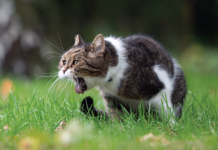Dear Elizabeth: My beloved 18-year-old kitty, Softball, has chronic renal failure and has recently become anemic. Her PCV is now 18 and she seems tired, sleeping most of the day. I also suffer from chronic renal failure and take Procrit for my anemia, and I know how much better I feel after starting the drug. I have asked my veterinarian about using Procrit for Softball but he seems reluctant. What are your thoughts? Chronic renal failure is a progressive, irreversible disease that slowly leads to impaired kidney function and serious consequences. The kidneys contain nephrons which are responsible for filtering the blood, removing waste products and regulating electrolytes. In CRF, the nephrons die, and waste products begin to accumulate in the body. Electrolytes may become imbalanced in CRF, leading to problems such as hypertension, seizures, muscle weakness and heart problems. One of the other important functions of the kidney is to produce erythropoietin, a hormone which stimulates the bone marrow to produce red blood cells. Cats with CRF dont produce enough erythropoietin, so their red blood cell production decreases and they become anemic. Without enough red blood cells to carry oxygen throughout the body, cats wont have their normal amount of energy. Other signs of anemia include pale or bluish gums, loss of appetite and, if severe, a rapid respiratory rate and even open mouth breathing/gasping for air. The heart will respond to the decreased circulating oxygen by pumping harder, leading to high blood pressure and an increased heart rate. Some cats will develop heart murmurs and eventually heart failure may occur. Anemia is diagnosed by a simple blood test called a Packed Cell Volume (PCV) or Hematocrit (Hct). PCV is the ratio of red blood cells to total blood volume and is easily measured with a test most veterinarians can run in the office. Anemia is present if the PCV is below 30 percent. If a veterinarian diagnoses anemia, another test may be needed to classify the anemia as regenerative or non-regenerative. Normally, the body will respond to anemia by producing immature red blood cells called reticulocytes. A reticulocyte test will look for these immature red blood cells. If reticulocytes are found in sufficient numbers, the bone marrow is functioning properly and another, often treatable, cause for the anemia must be found. In CRF cats, regenerative anemias are often due to bleeding gastrointestinal ulcers, but other causes include parasites, autoimmune diseases and cancer. If few or no reticulocytes are found, the anemia is considered non-regenerative, with fewer treatment options. Anemia in CRF cats generally develops slowly and the cats adapt to the anemia, perhaps not showing signs until the anemia has progressed to a PCV of 25 percent or less. In cats with non-regenerative anemia due to CRF, there are two treatment options, blood transfusions and treatment with erythropoietin. Blood transfusions are expensive, time-consuming and only last a maximum of five weeks. Erythropoietin can be a very effective treatment for CRF anemia in cats, rapidly raising the PCV and helping cats to feel remarkably better, but there is a potentially serious side effect that must be considered. The erythropoietin available for treating cats is human in origin and some cats will manufacture antibodies against what their bodies recognize as a “foreign” substance. The antibodies bind to not only the administered erythropoietin but also to the cats own erythropoietin, and cause a dramatic and sudden drop in PCV. For this reason, erythropoietin treatment is reserved for cats with relatively severe anemia. Your veterinarian can help you determine whether the potential risks of treating Softball with erythropoietin are outweighed by the benefits of treatment. Epogen and Procrit are two human erythropoietin products available in the US. Aranesp (darbepoetin) is a slightly different erythropoietin product that is garnering interest because it appears less likely to cause an antibody reaction in CRF cats. For more information on erythropoietin treatment,including clinical trials, see: http://www.felinecrf.org/anaemia.htm#esa. Cats being treated with erythropoietin must be carefully monitored for a sudden drop in PCV, as this may indicate an antibody reaction has begun. If the erythropoietin is stopped in time, the cats PCV will usually slowly return back to near pre-treatment levels as antibody levels wane, but blood transfusions may be necessary during this period. Love, Elizabeth



